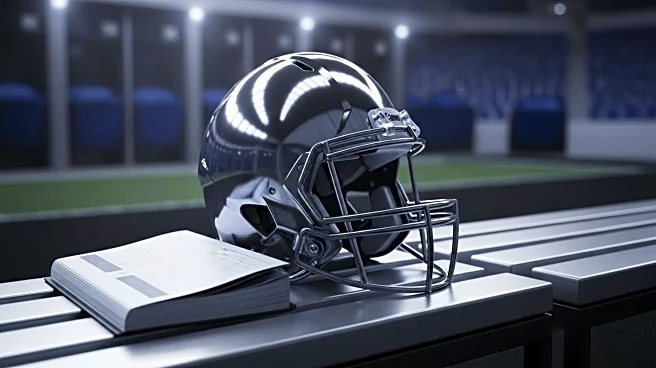What's Happening?
Joe Burrow, the Cincinnati Bengals' star quarterback, is facing another setback due to a turf toe injury that is expected to sideline him for three months. This injury comes after a series of previous health issues, including a knee surgery and wrist injury, which have disrupted his playing seasons. The Bengals, currently leading the AFC North with a 2-0 record, must now rely on backup quarterback Jake Browning to maintain their competitive edge. The situation underscores the importance of having a reliable backup quarterback, especially for teams with franchise players like Burrow. Historically, teams like the Eagles and Patriots have invested in backup quarterbacks, recognizing their potential to step in during critical moments.
Why It's Important?
The injury to Joe Burrow highlights the strategic importance of having a solid backup quarterback in the NFL. Teams with strong backup plans can mitigate the impact of losing their starting quarterback, ensuring continuity and competitiveness. This is particularly crucial for teams with Super Bowl aspirations, as a capable backup can keep the team in playoff contention. The Bengals' reliance on Jake Browning will test their depth and adaptability, potentially influencing their season outcome. The broader NFL landscape may see increased emphasis on drafting and developing backup quarterbacks, as teams seek to safeguard their investments in star players.
What's Next?
The Bengals will need to navigate the next three months without Joe Burrow, relying on Jake Browning to lead the team. Coach Zac Taylor has expressed confidence in Browning, and the team has added veteran quarterbacks to their practice squad as additional support. The Bengals face a challenging schedule, and Browning's performance will be critical in maintaining their playoff hopes. If Burrow can return by Week 14, the Bengals could still make a strong push for the postseason, provided they remain competitive in his absence.
Beyond the Headlines
The situation with Joe Burrow and the Bengals may prompt other NFL teams to reevaluate their quarterback strategies, considering the balance between investing in star players and ensuring depth in key positions. The ethical considerations of player health and safety also come into play, as teams must manage injuries and recovery processes responsibly.











